
Contrary to all of the hype about melting glaciers, at least 58 New Zealand glaciers advanced between 1983 and 2008. Indeed, Franz Josef Glacier advanced nearly continuously during those years. “We found that lower temperature caused the glaciers to advance, rather than increased precipitation as previously thought. These periods of reduced temperature affected the entire New Zealand region, and they were significant enough for the glaciers to re-advance in spite of human-induced climate change.”
It is not going to be fun trying to survive in the northern reaches of our planet. Remember that movie about the sudden onset of a new ice age where the scientist picks up a marker and sweeps it across the belly of America and says to the President, evacuate everyone below this line. Rapid cooling is happening to our beloved earth and there is nothing we can do about it except fantasize about global warming. The ice and snow that is headed our way is going to bury civilization in the northern latitudes in the next few decades.
Not going to happen from one week to another, like in the move ‘The Day After’, but this year is showing us how fast things can change, how deep the temperatures can drop, how snow accumulations can mount and how normal activities can be curtailed. Not much goes on during a blizzard and when the snow gets too deep roofs start collapsing. Perhaps the destined financial collapse will happen first, but cold climate change will offer us a staggering challenge that few are preparing for.
Billings Montana gives a bird’s eye view of what is happening in terms of amounts of snow. As of yesterday, Billings hadn’t seen this much snow by the 18th of February — ever — and 10 more days still remain in the month. As of Sunday night, at least 31.5 inches of snow had fallen this month, well on the way to breaking the previous February snowfall record of 37 inches set just three years ago in 2014. For the snow year so far, measured from July 1, snowfall stands at 76 inches, about 44 inches above normal. The 103.5 inches that fell during the 2013-2014 snow season made it the highest snow season on record.
We had record snowfall in northern Japan that broke a 47-year-old record. The snow depth in Horokanai, in northern Japan’s Hokkaido, has been measured at 3.124 meters (slightly more than 10 feet), setting a new local record. It beats the previous record of 3.119 meters set in 1970. Not surprisingly, locals say the huge amount of snow is making life difficult.
No one is quite understanding the consequences of global cooling and how fast it will affect most of our lives and this is complicated by the fact that the elite, government officials and the press are all hysterical about man made global warming. It is the biggest mistake any group of humans ever made, betting against Nature.
Global cooling will kick us where it hurts the most, in our stomachs, which will be deprived of foods because of shorter growing seasons. With global warming we had a chance of increasing agriculture growing zones pushing further and further north but with cooling its going to be a massacre. Humans will die in mass and populations will be reduced as elite desire.
Climate change is poised to affect the world’s food supply in three key ways, experts say. "There will be impacts on the quantity, quality and location of the food we produce," said Dr. Sam Myers, a medical doctor and senior research scientist studying environmental health at the Harvard T.H. Chan School of Public Health. "We’ve never needed to increase food production more rapidly than we do today to keep up with global demand," Myers told Live Science. That is going to be impossible in a cooling world where contracting growing seasons will collapse yields.
“The recent prolonged solar minimum and subsequent weak solar cycle 24 have led to suggestions that the grand solar maximum may be at an end,” says this study on nature.com. The study, published in 2015, looked at past variations of solar activity. In 2010, the study found, scientists estimated a mere 8% chance of a return to Maunder Minimum-like conditions within the next 40 years. However, “the decline in solar activity has continued, to the time of writing, and is faster than any other such decline in 9,300 years.”
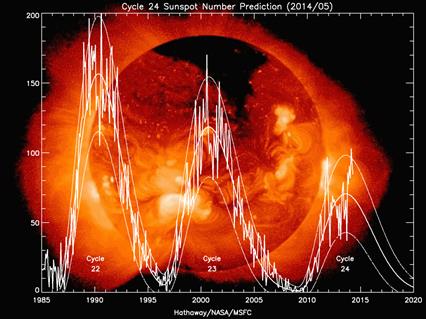
Interestingly Safe Haven, a financial site published the following on solar activity:
January’s Sunspot count came in at 6.7, which was down from December’s 8.2. The following chart includes the latest post and covers Solar Cycle 24. The high was 145 in February 2014, which compares to the high of 238 in September 2003.
With the decline in solar activity, the number of Spotless days continues to grow. It’s the way it works. So far, this year there has been 17 days, or 52% for the year. In all of 2017, the number was 104 days or 28% and the year before it was 32 days or 9%. For 2015 the count was zero, as it essentially was back to 2010.
They also published on the effects of diminishing solar winds:
As solar activity diminishes the Earth’s magnetic field also diminishes. This lets more cosmic rays through, which prompts more clouds. This increases the probability of precipitation. By reflecting more of the sun’s energy to outer space it also forces cooling.
This influence is beyond weather, it is climate and it is changing. The current part of the decline has yet to bring the average temperatures down. It will. The theory about cosmic ray influences is gaining widespread acceptance.
Exceptional Cold
Exceptional cold in Brail. First half of February totally out of the summer pattern, that is, mild or even cold. Cold and frost in southern Brazil in the height of summer. Exceptional cold in Russia. On Wednesday, February 21, the minimum temperature in Moscow will drop to -14 to -19°C. On Thursday, February 22, the temperature will drop to -18 to – 20°C. The coldest day will be February 23, when the temperature will drop to -20 to – 25°C. The average daily temperature will be below the norm by 12 degrees! Temperatures near Moscow eventually dropped to -30°C.
Timothy Mytton-Watson, who runs renovation and repair pool business in Austrailia, which is being hurt by lower summer temperatures said, “You can feel the desperation out there. It’s really strange. I’ve only jumped in my pool three times this whole summer. Usually it’s 40 times.” Its been running a chilly 15 to 17 degrees at night and it’s the height of the summer! This will be the first time in 16 years that Pert will not deliver a 40-degree day this summer.
Bozeman Yellowstone Airport is reporting a colder than normal February. Average temperature through the 22nd is 15.7°, which is -10.6° below normal and the 13th coldest on record so far.
Rankin Inlet freeze
Rankin Inlet in a deep freeze of -60C a couple weeks ago.
Here is the news from the Artic Circle where record breaking temperatures are supposed to be melting all the ice:
Temperatures are getting to –40 C before the wind-chill and when the winds are factored in, it feels colder than –60 C.
“You’ve got blustery winds with some of the coldest temperatures that people have ever experienced,” said David Phillips, senior climatologist with Environment Canada, adding that his charts say skin freezes in two minutes at –55 C.
Blame for the 15 degrees colder than normal temperatures is being placed on the polar vortex, a combination of an aggressive weather system and frigid air temperatures. That’s a funny way of saying its 15 degrees colder than normal because global temperatures are plunging. Its cold because we are living on a cooling planet because of a decline in solar activity, and all that results from that.
More Ice

This image from the National Snow and Ice Data Center (NSIDC) clearly shows no shortage of ice. The white area shows Arctic sea-ice extent as of January 2018. The magenta line shows the 30-year median sea-ice extent for January. Not exactly the catastrophic ice loss that we’ve been led to believe, is it? Yet in the news we read:
The world’s sea ice shrank to a record January low last month as the annual polar melting period expanded, experts say. The 5.04 million square miles of ice in the Arctic was 525,000 square miles below the 1981-to-2010 ice cover average, making it the lowest January total in satellite records, according to the US National Snow and Ice Data Center (NSIDC).
In the above image does it look like uncontrolled global warming that is melting the poles? Read: “Additionally, James G. Anderson, Harvard professor of atmospheric chemistry, says the chance of permanent ice remaining in the Arctic after 2022 is zero. Already, 80% is gone.” In the above image, does it look anywhere near 80% gone? Today almost anyone can write anything and get away with it with no sense of responsibility of even trying to be near to the truth.
Record snowfall in Norway brings warnings of roof cave ins. Several instances of property owners needing to dig tunnels to their front doors. Heavy snowfall this winter continues to set new records.
Exploding Volcanos Equals More Cooling

Siberian super frost to invade large portion of Europe
https://www.iceagenow.info/wp-conten...lo-21Feb18.png
Will be an “epochal event,” warns Italian website. “Truly extraordinary.” “Historical.” A “truly extraordinary” wave of frost will cover more than half of Europe, warns Meteo Giornale. A mass of very cold, glacial air will stretch directly from Siberia into Russia, cross the Urals and then expand to the heart of the Old Continent. It will be “an epochal event for the end of February,” not only in Italy, but also in parts of Europe. “It is very unusual at the end of February to have to deal with freezing flows of such intensity, it is a historical.” Today as the cold reached the UK wind chill during the day will feel like -10C to -15C.
Two weeks before a cold snap griped much of the Spanish peninsula reduced the availability of vegetables and salads on the European market. The extreme cold has even extended beyond southern Europe and into Africa! For example Southern Morocco saw snow for the first time. And so has the Canary island of Tenerife seen its landscape get blanketed with the white stuff.
]. Meltwater outflows into the Antarctic ocean could trigger sea level rises. "We just don't know about how active these volcanoes have been in the past," Bingham said.










 Reply With Quote
Reply With Quote





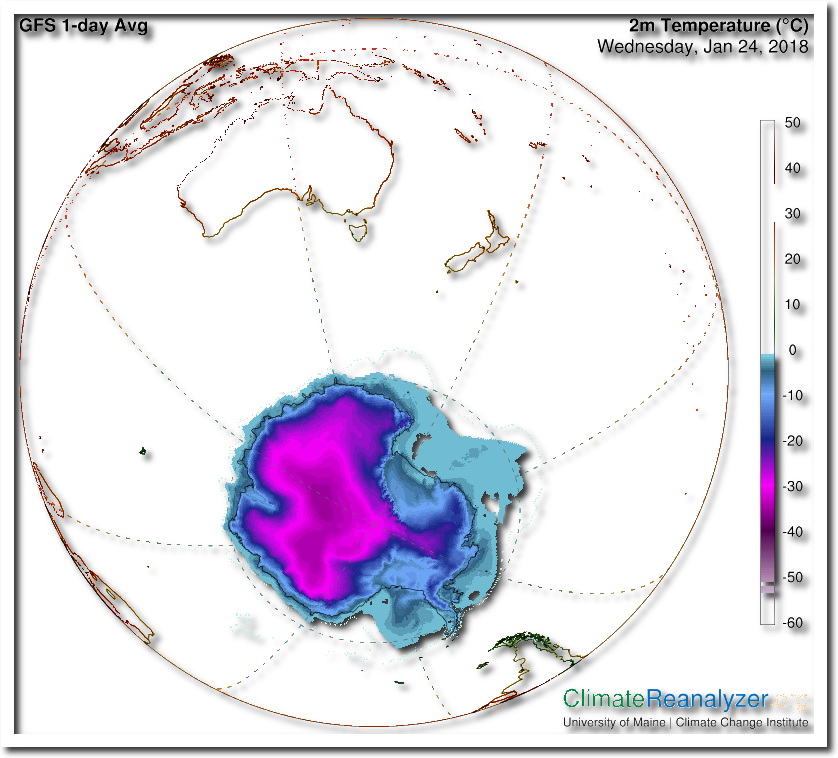
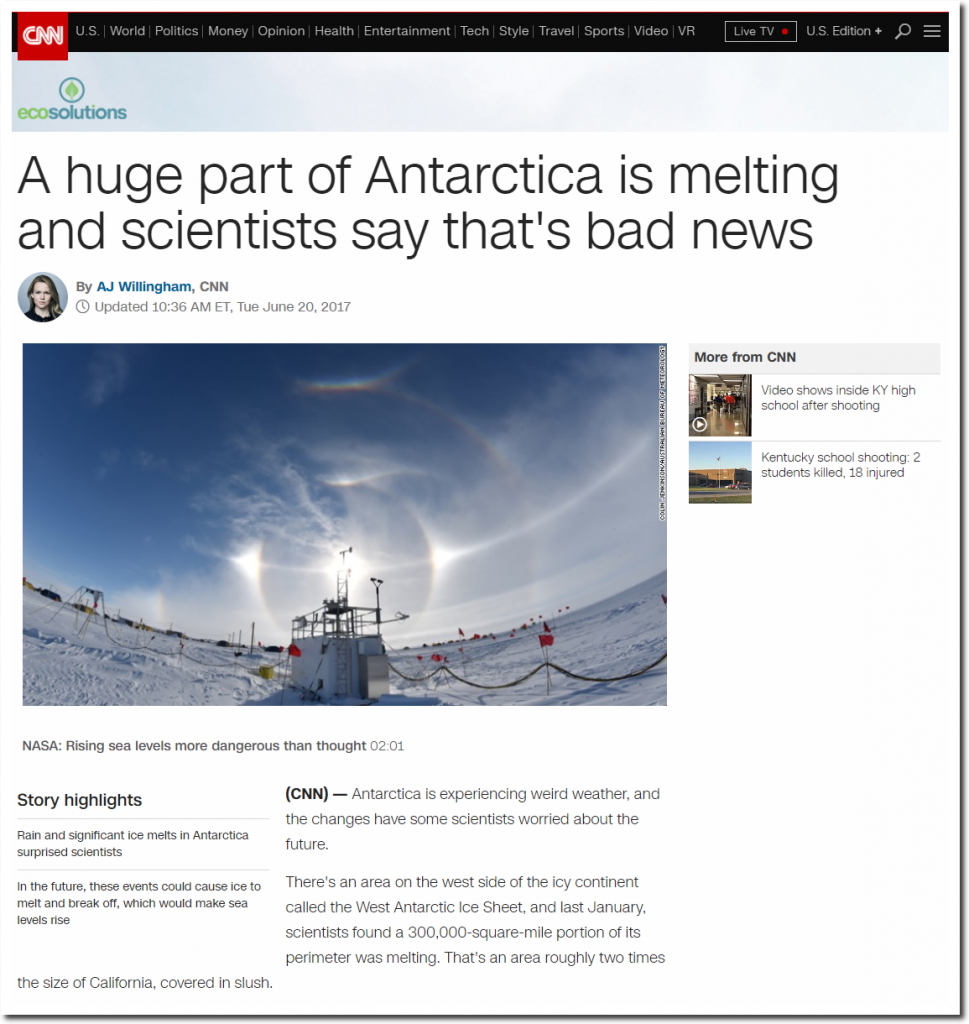
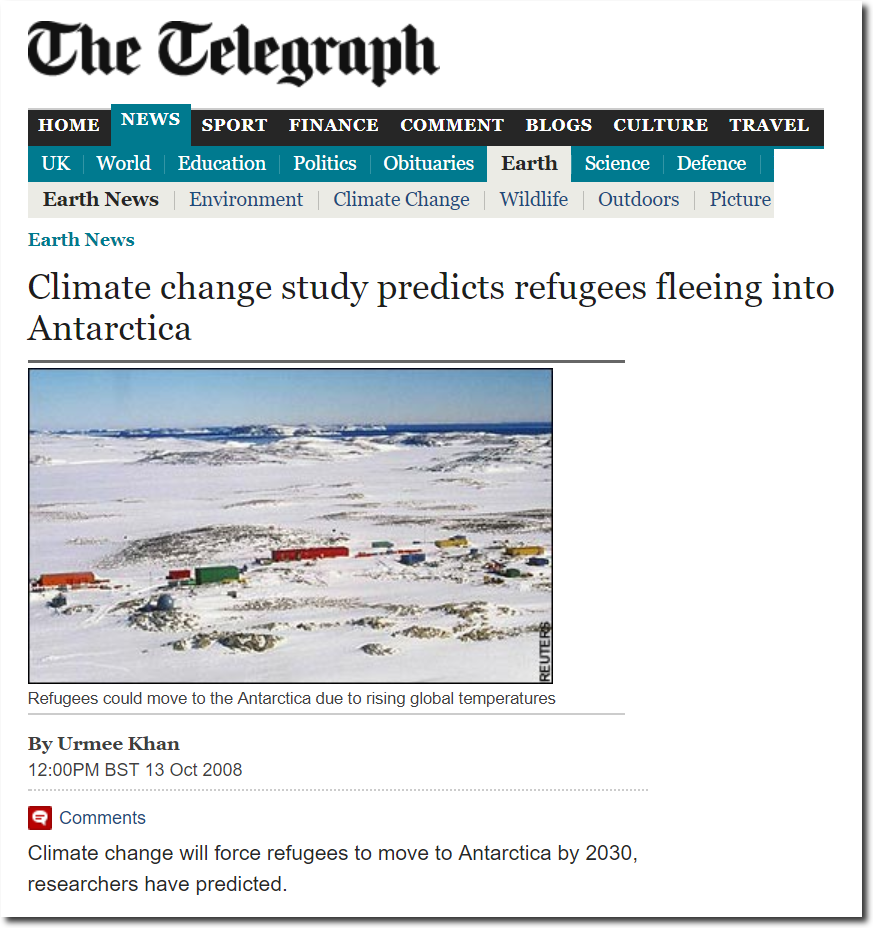








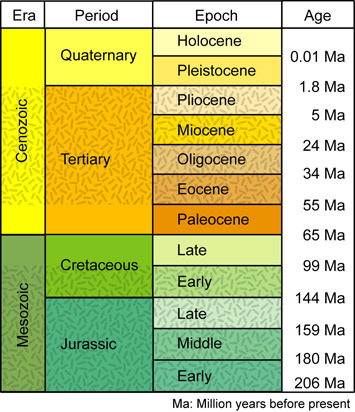



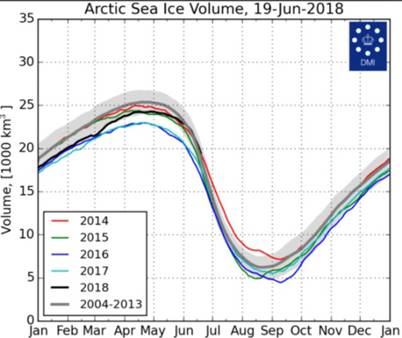

Bookmarks